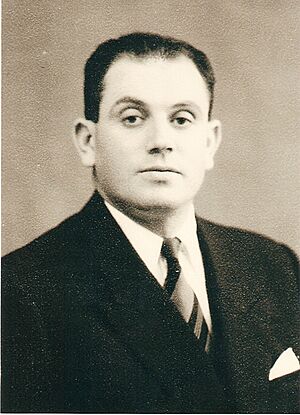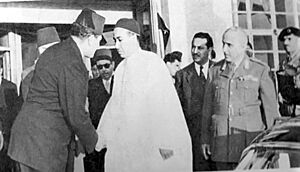Hussein Maziq facts for kids
Quick facts for kids
Hussein Maziq
حسين يوسف مازق |
|
|---|---|
 |
|
| Prime Minister of Libya | |
| In office 18 March 1965 – 2 July 1967 |
|
| Monarch | Idris I |
| Preceded by | Mahmud al-Muntasir |
| Succeeded by | Abdul Qadir al-Badri |
| Foreign Minister of Libya | |
| In office 22 January 1964 – 18 March 1965 |
|
| Prime Minister | Mahmud al-Muntasir |
| Preceded by | Mohieddin Fikini |
| Succeeded by | Wahbi al-Bouri |
| Governor of Cyrenaica | |
| In office May 1952 – October 1961 |
|
| Preceded by | Muhammad Sakizli |
| Succeeded by | Mahmud Buhedma |
| Personal details | |
| Born | 26 June 1918 Tacnis, Libya |
| Died | 12 May 2006 (aged 87) Benghazi, Libya |
Hussein Yousef Maziq (Arabic: حسين يوسف مازق) was an important Libyan politician. He was born on June 26, 1918, and passed away on May 12, 2006. He served as the Prime Minister of Libya from March 20, 1965, to July 2, 1967. Hussein Maziq was one of the most influential people during the time when Libya was a kingdom.
Contents
Hussein Maziq's Family Story
Hussein Maziq came from the Haddouth family, part of the Barasa tribe in Cyrenaica, Libya. His family had a long history of leadership. Haddouth, who the family is named after, was already leading the Barasa tribe in 1822.
His son, Abubakr, took over the leadership. In 1844, the Ottoman Empire appointed him as a Bey. This meant he was a leader over all the Harabi tribes, which included the Barasa and Ubaidat tribes. Abubakr was involved in the Barasa-Ubaidat War in 1860. He later moved to Benghazi and died there in 1870.
Abubakr's son, Maziq (Hussein's grandfather), inherited the leadership. He helped manage the conflict until the tribes agreed to make peace in 1890. Maziq remained the leader of the Barasa until he died in 1909. He had four sons: El Mabrouk, Yousef (Hussein's father), Bushdeig, and Uroug.
When the Italians invaded Libya in 1911, El Mabrouk led the Barasa tribe against them, just like other tribal leaders. He was killed in a battle near Derna in 1912. Since he had no children, Yousef, Hussein's father, became the new leader of the Barasa.
Growing Up in Libya
Hussein Yousef Maziq was born in 1918 near Tacnis, a town about 120 kilometers east of Benghazi. Because his father, Yousef, was connected to the Libyan resistance leaders, the Italian government arrested him. They sent Yousef, his wife Mardiya, and baby Hussein away to Cyrene. Yousef stayed there until he died in 1934.
Before his death, Yousef lost his eyesight. So, the leadership of the Barasa tribe was passed to his brother, Bushdeig. In 1929, Bushdeig attended important talks in Sidi Rhuma. These talks were between the resistance leaders, led by Omar Mukhtar, and the Italian government in Libya. Hussein, who was 11 years old at the time, was also there. He later said that he met Omar Mukhtar, who knew his parents.
Maziq went to an Italian school in Cyrene for a short time. However, the Italian government stopped him from continuing his studies. In 1937, he worked as a supervisor on the Via Balbia road project. His job was to manage the records for the salaries and savings of the Libyan workers.
In 1940, Maziq and several other important men from Cyrenaica were invited to visit Italy. There, they met Benito Mussolini, who was Italy's leader. Maziq was worried about attacks from the Allies' Navy. He wanted to return to Libya before Italy joined the war. He arrived back in Libya about two weeks before Italy declared war on France and Britain on June 10, 1940.
In 1943, during World War II, the Italians were forced to leave Libya. In 1944, Emir Idris Senussi returned to Libya from exile. Around 1946, he met Maziq for the first time and was very impressed by him. This meeting marked the beginning of Hussein Maziq's political career.
Leading as Governor
On June 1, 1949, Emir Idris declared that Cyrenaica was "independent." Even though the British still had a lot of influence, a new government was needed. After a short government led by Omar Pasha El Kikhia, Muhammad Sakizli formed a new cabinet in 1950. At 32 years old, Maziq became the Minister for Interior and Education under Sakizli.
When King Idris I of Libya declared Libya's full independence on December 24, 1951, Sakizli's title changed to "Governor" of Cyrenaica. He stayed in that role until May 1952. Then, Hussein Maziq was chosen to be the new governor.
Important Decisions as Governor
During Maziq's time as governor, one of the most challenging events was the death of Ibrahim El Shalhi on October 5, 1954. Ibrahim El Shalhi was a trusted helper to King Idris. A young grandson of Ahmed Sharif es Senussi was responsible for his death. The young man was tried and later executed.
However, some people close to the King, like Busairi El Shalhi (Ibrahim's son), wanted more punishment. They wanted the killer's cousins to be punished too. Maziq disagreed with this idea of extending the punishment to others. This disagreement did not harm his relationship with the King. However, Maziq did not like some of the King's close advisors, including Busairi. Their disagreements eventually led to Maziq's resignation on October 15, 1961.
After this, Maziq did not hold any political positions until January 1964. At that time, he became the Foreign Minister in Mahmud al-Muntasir's government. Soon, new challenges arose. On February 22, 1964, President Gamal Abdul Nasser of Egypt gave a speech. He said that foreign military bases in Libya were a danger to all Arab nations.
This speech, along with negative news about Libya in Egyptian media, upset many Libyans. So, al-Muntasir decided to start talks with Great Britain and the United States to remove their military bases. Maziq was put in charge of these important negotiations.
Later that year, Maziq was at an Arab summit in Cairo. Unexpectedly, President Nasser told him not to rush the removal of American forces from Libya. This happened after the United States put pressure on Nasser. This meant the talks about removing the bases were put on hold. Maziq shared this story when he defended himself in the Libyan People's Court in 1970.
Becoming Prime Minister
On March 20, 1965, al-Muntasir resigned as Prime Minister due to health reasons. Hussein Maziq was then asked to form the new government. As Prime Minister, he continued to work on the five-year plan for development (1963–1968), just like the previous governments. However, he still had concerns about some people close to the King. Although Busairi El Shalhi had died in a car accident in 1964, another person named Abdullah Abid es Senussi was still influential. Maziq sent a report to King Idris about concerns regarding Abdullah Abid's financial dealings.
Challenges as Prime Minister
Unfortunately, more difficulties arose. After the Arab countries faced defeat in the Six-Day War in June 1967, many Libyans felt angry and sad. Some people attacked the U.S. and British embassies. There were also attacks on the Jews in Libya. Because of this, Maziq had to allow the Jewish community to leave the country safely. Finally, King Idris asked him to resign, which he did on June 29.
Later Life and Legacy
For the rest of the Kingdom era, Hussein Maziq did not hold any government positions. He was outside Libya when the coup d'état happened on September 1, 1969. However, he returned to Libya. Like most officials from the Kingdom era, he was put on trial in the Libyan People's Court. He was later sent to prison. In court, he explained his relationship with King Idris. Maziq was sentenced to a ten-year prison term in 1971, but he was released earlier in 1974.
Hussein Maziq lived the rest of his life at his home in Benghazi. He passed away on May 12, 2006, at the age of 87.
 | Janet Taylor Pickett |
 | Synthia Saint James |
 | Howardena Pindell |
 | Faith Ringgold |


